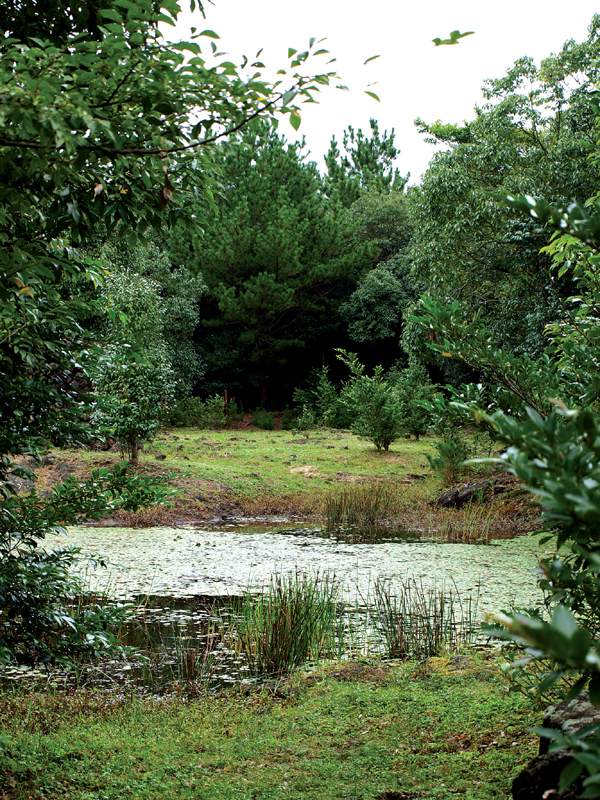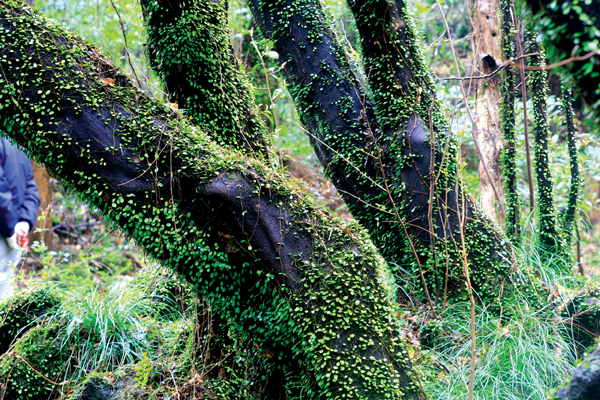
- Updated 2024.4.24 17:16
- All Articles
-
member
icon
-
facebook
cursor
-
twitter
cursor
|
NewsRenewable Energy |
Island’s Gottjawal forest is ‘Lung of Jeju’Unique underground aquifer key to Jeju’s ecosystem, needs protection |
|
| |
 |
|
| Gotjawal's underground aquifer ratains around 46% of the rainfall it experiences; making it Korea's the most "active" aquifer. Photo courtesy Jeju Provincial Govt. |
Beautiful, tranquil and unique are just some of the words that abound when people talk about Jeju Island, but these words have never been more apt than when used to describe Camellia Hill, a region of Gottjawal forest in Jocheon-eup.
The tall Bell-Thorn evergreens are densely packed, their branches crisscrossing against the sky so that the only light that filters through is tinged with green. Between them small ferns and Camellia trees grow; hence the name. The forest is largely uncultivated and undeveloped, save for a winding, unpaved path that has gradually appeared thanks to its visitors. It feels wild, the only sounds the hum of insects and caw of birds; not a single car engine can be heard. This lost world of plants and wildlife is not, in itself, the only reason that Camellia Hill in Jocheon-eup is special; the other reason is that beneath the ground of the 590,083 sq. metre forest can be found the ‘Lung of Jeju’.
Volcanic formation
Beneath the grass and moss that blanket the forest floor is a rough, uneven surface of cooled AA and Pahoehoe lava. These types of lava, produced during the formation of Mt. Halla, are very different from each other. Pahoehoe lava is very smooth but AA lava, a form of Basaltic lava, is comprised of rubble known as ‘clinker’. This is what created, beneath the forest floor, a layer of water-bearing permeable rock. 46% of rain water that falls over Gottjawal forest permeates down into these rocks- the highest permeation rate of anywhere in Korea.
This means that on the East and West of the island, where Gottjawal is found, there are virtually no rivers. It is this underground water system that has earned Gottjawal the nickname ‘Lung of Jeju’ and what makes it unique throughout Korea.
Gottjawal forest can be found across the slopes of Mt. Halla, not only at Camellia Hill in Jocheon-eup, but also in Hankyung-Anduk, Aewol and Koojwa-Sungsan, encompassing 224 sq. kilometres in total.
| |
 |
|
| Jeju's Gotjawal forest is home to the Mankyua Chejeunse, a plant that lives nowhere else in the world; as well as around 1,900 other species of plant, many of them endangered. Photo by Cat Lever |
Endangered species
Thanks to its rocky terrain which is unsuitable for farming, Gottjawal has remained, for the most part, uncultivated throughout the 20th century; allowing many species of plant, insect and animal to flourish undisturbed. The Mankyua Chejeunse, a recently discovered genus of plant, grows nowhere else in the world and hundreds of other species also exist within the confines of the almost impenetrable trees.
Around 800 types of plants grow in Jeju’s Gottjawal forest making up 45% of the island’s 1,990 plant species; existing on only 6.1% of Jeju’s land. Many endangered animal species also make the forest their home including several species of bird, among them the Fairy Pitta and Japanese Paradise Flycatcher. In addition to this, in the Gottjawal sporadic marshlands five previously unrecorded species of plankton were found in 2005.
| |
 |
|
| Jeju's Gotjawal forest is home to the Mankyua Chejeunse, a plant that lives nowhere else in the world; as well as around 1,900 other species of plant, many of them endangered. Photo courtesy Jeju Provincial Govt. |
Threat of development
While the Gottjawal forest has been left without interference from people for centuries, in the 1980s some parts of it began to be used for modern development; despite the government’s designation of the Camellia Hill Gottjawal as a Local National Monument in 1981. New technology meant it was possible to flatten the rocky areas and this lead to the building of several golf courses to support Jeju’s tourist trade. Some residents reacted strongly to this, feeling that Gottjawal needs to be protected and expressing concern about heavy groundwater consumption by the golf courses.
Many researchers have suggested that golf courses are the main cause of groundwater exhaustion and as groundwater resources are finite, and the only source of water for 500,000 Jeju residents, many people feel that the use of these resources for household, agricultural and industrial purposes needs to be eased off. They argue that protecting the forest from future development would allow the Gottjawal groundwater time to “recharge”.
Researchers have estimated that water used by Jeju’s 16 golf courses in 2004 was 39,303 tons per day.
In response to this the Jeju Provincial Government established the Gottjawal Trust in 2006 dedicated to the conservation of the Gottjawal forests. They have, however, been criticised for allowing further construction of golf courses and other tourist facilities that threaten the survival of Gottjawal.
The Jeju government is currently seeking official Ramsar certification for Gottjawal. Secretary general of Ramsar, Anada Tiega,visited Korea for the 2008 Ramsar Convention and expressed his view that Jeju’s Gottjawal deserved this status; due, in part, to its unique ecosystem and underground aquifer. Many local residents and conservationists hope that this designation could offer Gottjawal a stronger kind of protection from threat of further development.
Gottjawal comprises part of Olle course 11. More information can be found at: http://www.jejuolle.org/eng/course/co_course.html?csno=11
|
|
|
|
|
|
|
|
|
|
|
ⓒ Jeju Weekly 2009 (http://www.jejuweekly.net)
All materials on this site are protected under the Korean Copyright Law and may not be reproduced, distributed, transmitted, displayed, published without the prior consent of Jeju Weekly. |
|
|
|
|
| Jeju-Asia's No.1 for Cruise |
|
|
|
Title:The jeju Weekly(제주위클리) | Mail to editor@jejuweekly.net | Phone: +82-64-724-7776 Fax: +82-64-724-7796
#503, 36-1, Seogwang-ro, Jeju-si, Jeju-do, Korea, 63148
Registration Number: Jeju, Ah01158(제주,아01158) | Date of Registration: November 10,2022 | Publisher&Editor : Hee Tak Ko | Youth policy: Hee Tak Ko
Copyright ⓒ 2009 All materials on this site are protected under the Korean Copyright Law and may not be reproduced, distributed, transmitted, displayed, published
without the prior consent of jeju weekly.com.

|






















